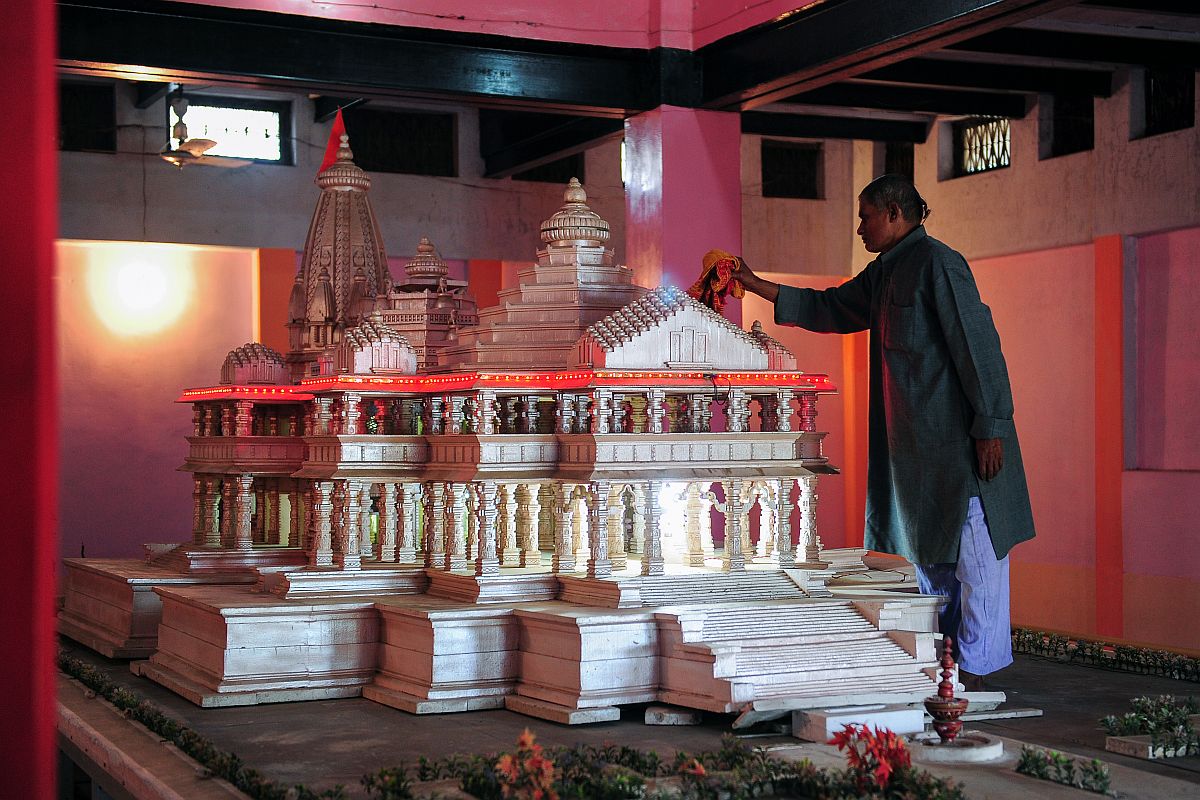Supreme Court rejects 100 per cent cross verification of EVM votes with VVPAT slips
The top court also rejected the prayers of petitioners to return to ballot paper voting system, calling it foible and unsound.
The top court had ruled that the disputed 2.77-acre land will be taken over by a Government trust for the construction of the temple, while a suitable plot of 5 acres at a prominent site in Ayodhya will be given to the Sunni Wakf Board.

A model of a proposed Ram temple in Ayodhya. (Photo: AFP)
Senior lawyer Rajeev Dhavan, who represented the Sunni Waqf Board and other Muslim parties in the Ayodhya case in Supreme Court, on Tuesday said that he has been removed from the case.
Dhavan made this announcement in a Facebook post published early Tuesday morning.
He wrote: “Just been sacked from the Babri case by advocate-on-record Ejaz Maqbool, who was representing the Jamiat. Have sent formal letter accepting the sacking without demur. No longer involved in the review of the case.”
Advertisement
Dhavan further stated that he was sacked stating he is unwell. The senior advocate termed the action as “total nonsense”.
“I have been informed that Mr Madani has indicated that I was removed from the case because I was unwell. This is total nonsense. He has a right to instruct his lawyer AOR Ejaz Maqbool to sack me which he did on instructions. But the reason being floated is malicious and untrue,” Rajeev Dhavan said in another post.
Speaking to ANI, advocate-on-record Ejaz Maqbool clarified: “It is wrong to say that Mr Rajeev Dhawan was removed from the case because of his illness. Issue is that my client (Jamiat Ulema-e-Hind) wanted to file the review petition yesterday itself. It was to be settled by Mr Rajeev Dhawan. I could not give his name in the petition because he was not available. It is not a big issue.”
On Monday, Muslim body Jamiat Ulema-e-Hind filed a review petition against the Supreme Court’s decision to allot the disputed 2.77-acre land to Hindu side and a separate 5-acre land to Muslim side in a prominent place in Ayodhya.
The review petition was filed by Jamiat Ulema-e-Hind chief Maulana Syed Ashhad Rashidi, who is also the legal heir of litigant of Ayodhya land dispute, M Siddiq.
On November 9, a five-judge bench headed by former Chief Justice of India, Ranjan Gogoi gave the verdict on the 134-year-old politically sensitive land dispute.
The five-judge bench delivering the verdict said the possession of the disputed 2.77-acre land rights will be handed over to the deity Ram Lalla, who is one of the three litigants in the case. The possession, however, will remain with a central government receiver.
The Sunni Waqf Board had said that it will not seek a review petition of the court judgment while Jamiat Ulama-I-Hind and All India Muslim Personal Law Board have maintained that they are dissatisfied with the apex court’s decision.
AIMPLB is also expected to file a review petition against the court’s decision as its General Secretary said that the trust of Muslims has weakened after the court’s decision. The board is expected to file the petition before December 9.
Advertisement